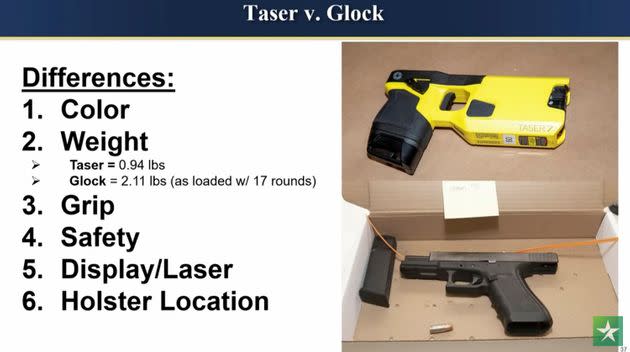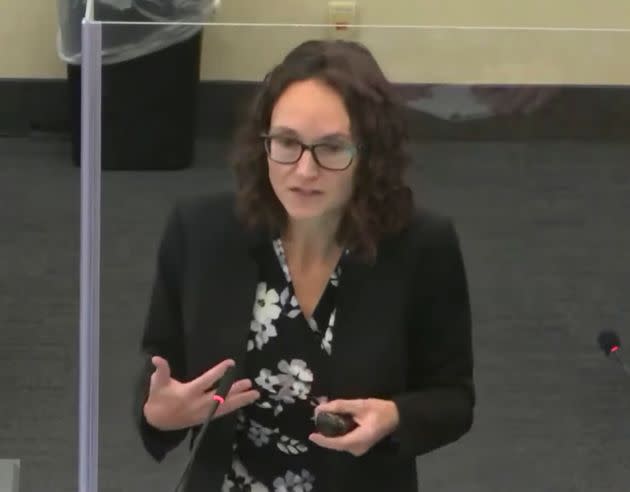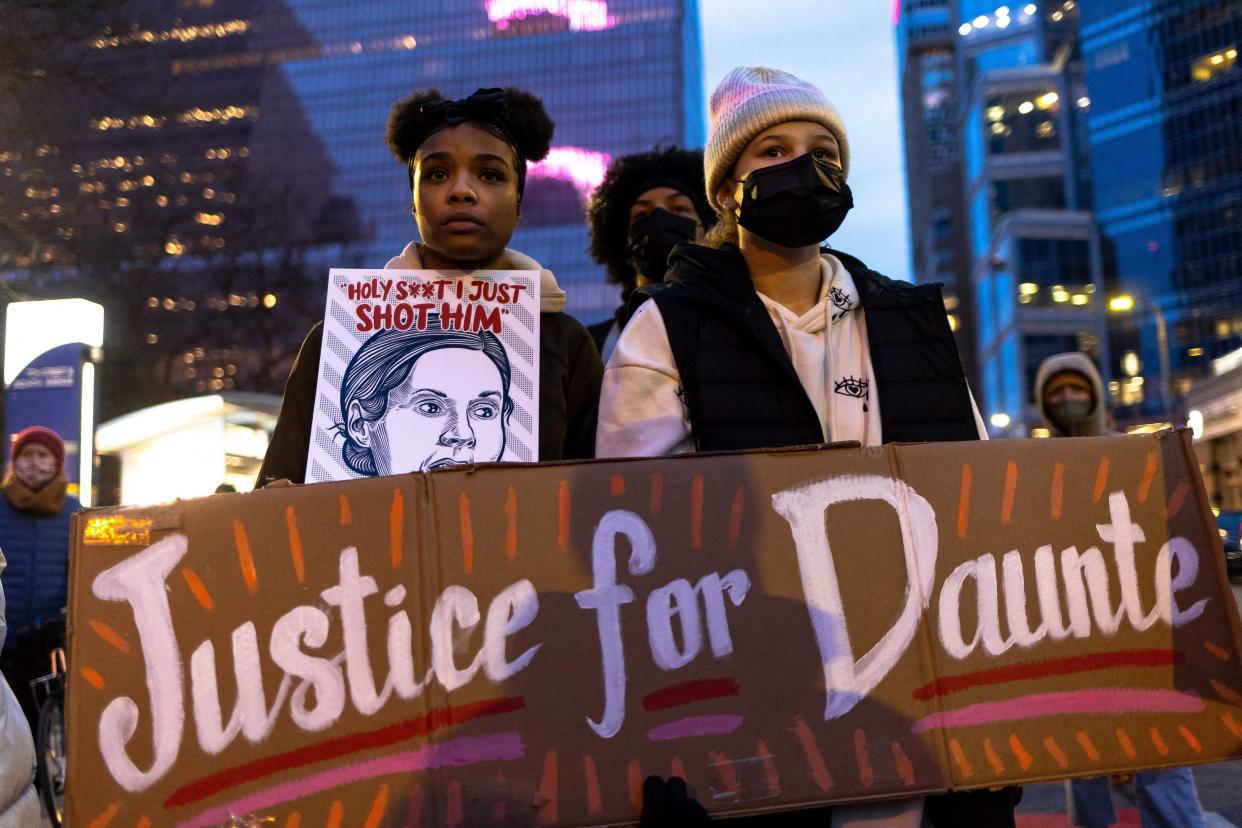Ex-Cop Who Killed Daunte Wright ‘Betrayed Her Badge,’ Prosecutor Says In First Day Of Trial
The trial of former Minnesota police officer Kim Potter, who fatally shot 20-year-old Black motorist Daunte Wright during an April 11 traffic stop, opened Wednesday in a case that has added fuel to the outrage over reports of police brutality.
State prosecutors and the defense presented opening arguments to the anonymous, mostly white jury at the Hennepin County Courthouse ― where earlier this year former police officer Derek Chauvin was convicted and sentenced for murdering George Floyd, a Black man whose 2020 death lit a fire under the country that ignited massive racial justice protests.
As an officer in the Minneapolis suburb of Brooklyn Center, Potter killed Wright during a stop that was recorded on her body camera and from her squad car. The white officer resigned from the police department two days later, and she maintains that she mistakenly drew her gun instead of her Taser while trying to stop Wright from fleeing in his car.
Potter is charged with first- and second-degree manslaughter in Wright’s death. Prosecutors on Wednesday argued that the veteran police officer had been repeatedly trained over years on how to avoid the deadly mix-up between a gun and a Taser and yet still got it wrong, costing Wright his life. The state stressed that it is not arguing whether Potter intentionally killed Wright but rather if she ignored her years of training when interacting with the unarmed 20-year-old.

Potter’s lawyer, Paul Engh, argued that she had simply made a mistake but that she would have been justified in shooting Wright even if she had intentionally drawn her gun because the Black man could have posed a threat. Engh also cast blame on Wright for his own death by not complying with the police.
“All Mr. Wright had to do was stop. He was told he was arrested on a warrant. He resisted, she said, ‘I’ll Tase you,’ and all he had to do was surrender. That wasn’t his plan. … All he had to do was stop and he’d be with us.”
Prosecutor Erin Eldridge stressed that Wright was unarmed and not a violent threat to officers when Potter killed him.
“He had no weapon. He was not violent. He did not threaten the officers in any way,” she told jurors. “He didn’t reach for anything, he got in the car, put his hands on the steering wheel, didn’t come at the officers, didn’t throw any punches, didn’t kick anyone.”
The jury saw police body camera footage as well as the squad car’s dashboard video showing Potter threatening to shock Wright with a Taser while her trainee, Officer Anthony Luckey, tried to yank the man out of the car. Police initially pulled Wright and a female passenger over for having an air freshener hanging on the car’s rearview mirror and for expired registration tags after Luckey said he was suspicious that the vehicle had its turn signal on for the wrong direction.
When the officers discovered that Wright had an outstanding warrant for a gross misdemeanor weapons charge, they tried to arrest him. The 20-year-old initially cooperated before getting back into his car. Officers then escalated the use of force and Potter yelled “Taser!” before firing her gun at Wright’s chest. She then appeared to go into a panic and exclaimed that she used the wrong weapon. The car, with Wright wounded and still in the driver’s seat, drove away and then crashed into another car.

“She was trained not to use unnecessary force. She was trained not to shoot an unarmed driver. She was trained not to fire into a vehicle, and she was also trained not to use her Taser on a fleeing suspect,” Eldridge said. “And she was trained to be aware of the differences between her gun and her Taser. And importantly, she was also trained about the risks of pulling the wrong weapon and that drawing and firing the wrong weapon could kill someone.
“Now, this was exactly what she had been trained for years to prevent. But on April 11, she betrayed her badge, and she failed Daunte Wright.”

The jury also heard from two of the state’s witnesses: Wright’s mother, Katie Bryant, and Luckey. Bryant testified that she was watching Wright’s son, Daunte Jr., and saw her son that afternoon when he asked for money so he could get a car wash. The car was registered in his brother’s name, but Wright had bought it from him two weeks before he died.
Wright called his mother 10 minutes after leaving to ask which carwash to go to, then called again 10 minutes later to say he had been pulled over for having an air freshener. Bryant said she told him to give the phone to the officer so she could discuss the car insurance status, but she eventually heard an officer tell Wright to step out of the vehicle.
Bryant said she heard Wright’s phone being put down and an officer saying, “Don’t run,” while Wright responded, “No, I’m not.” The phone allegedly disconnected at that point, and after several attempts to call back, Bryant tried to FaceTime her son. She said a woman answered the video call and revealed that police had shot Wright, showing his body in the driver’s seat. Bryant then found out from police the location of Wright’s car and arrived at the scene, where she saw her son’s body on the ground.

Luckey, the first officer to approach Wright, had started working at the department in February. The officer testified he began following Wright’s car based on “intuition,” which he later said was based on the area’s crime rate. Wright told Luckey he didn’t have a license, that he was looking for the insurance and that he is working on getting up-to-date tags now that the car was his, he testified.
The officer said that he was reaching into the car when he heard the gunshot and that he jumped back and saw Wright put the car in drive before taking off. Luckey said he knew the gunfire did not come from Wright because he could see his hands. He also said that Wright had never appeared to reach for a gun, that he never punched the officer and that when he was pulled over he was respectful and not threatening. He believed Wright was telling the truth and that the female passenger did not appear to be in distress.
“Officer Luckey was her trainee and she was the [trainer]. So she was the one who determined how the stop would go,” Eldridge said of Potter. “She was the 26-year veteran. She was the officer in charge. And it was her job to show Officer Luckey how it’s done. And what did she show him? She showed him how to kill someone.”
The more serious charge against Potter requires prosecutors to prove recklessness. The lesser charge requires proof of culpable negligence.
This article originally appeared on HuffPost and has been updated.




